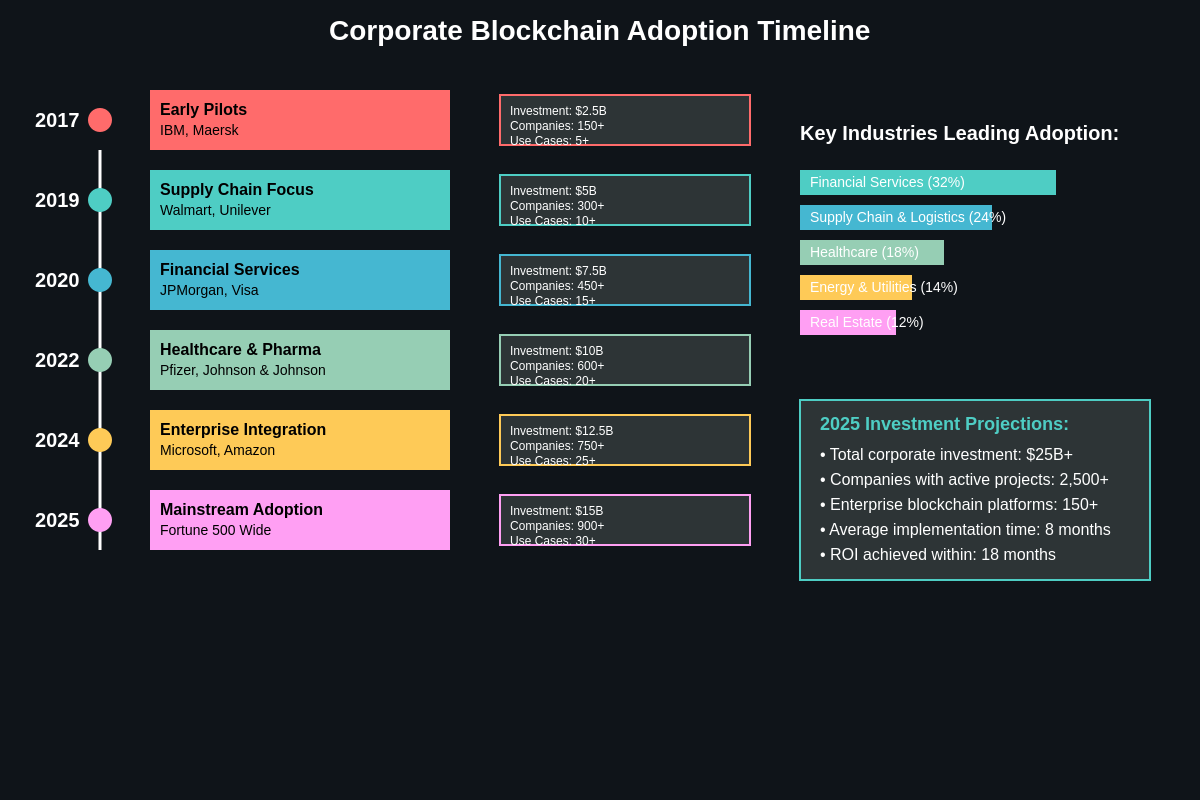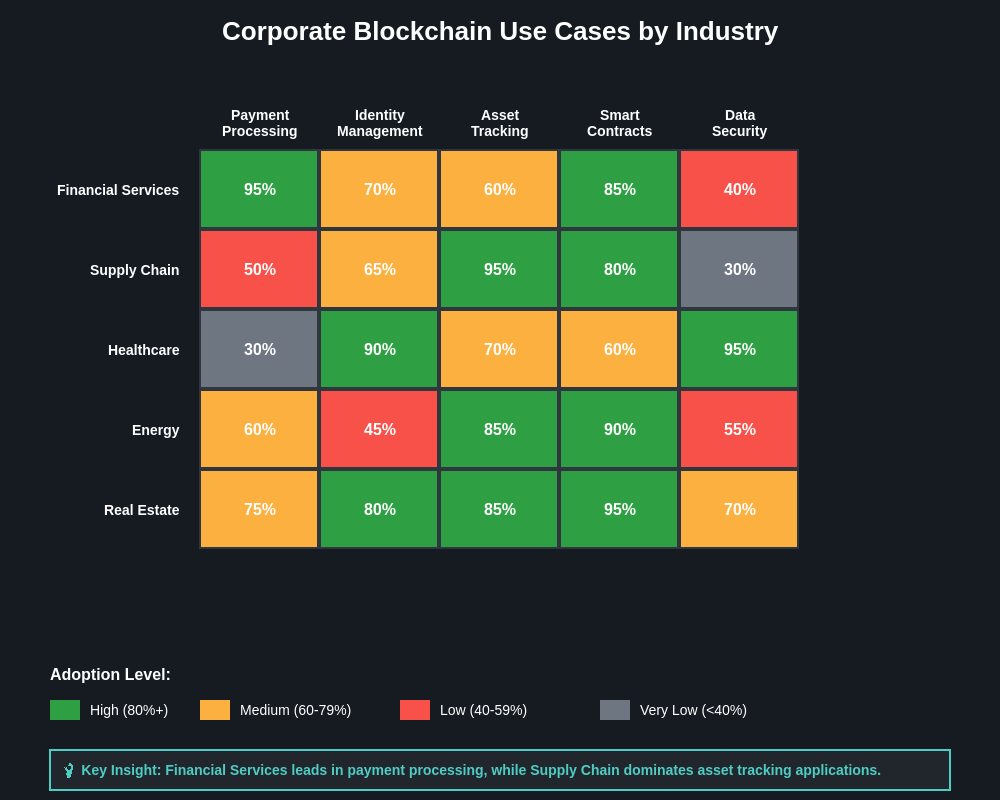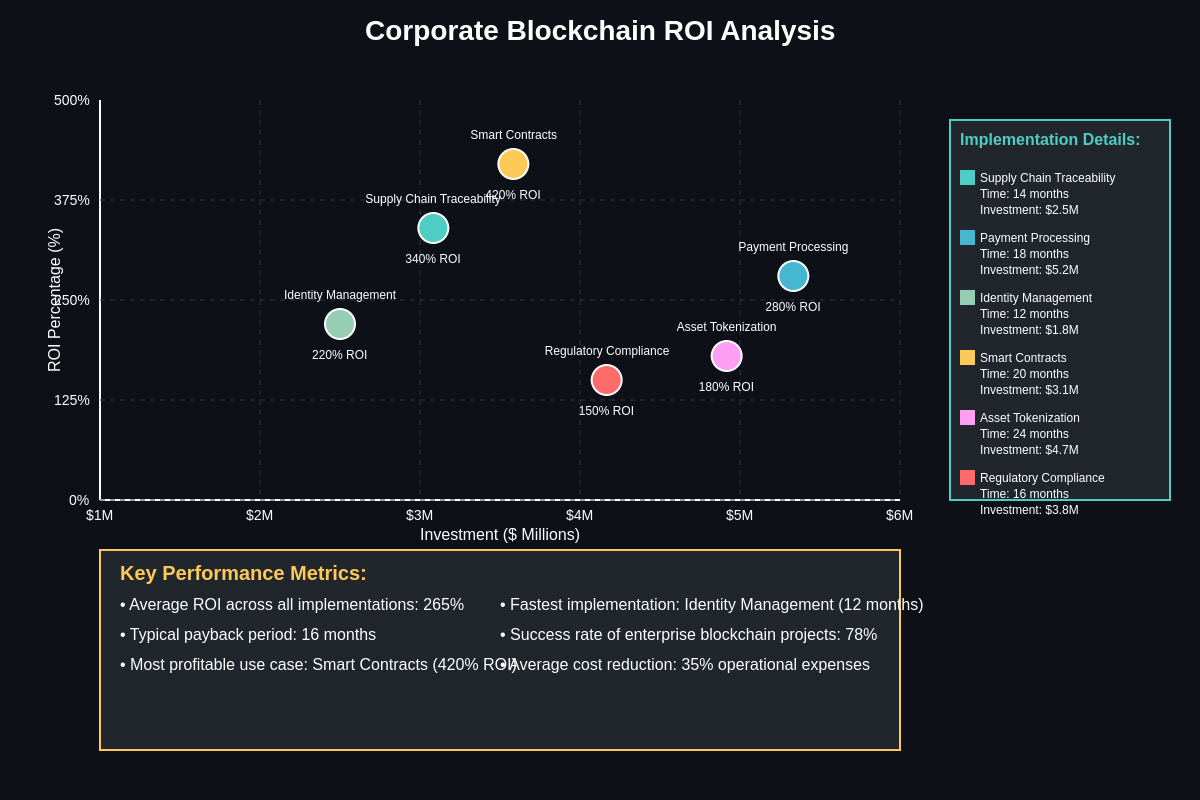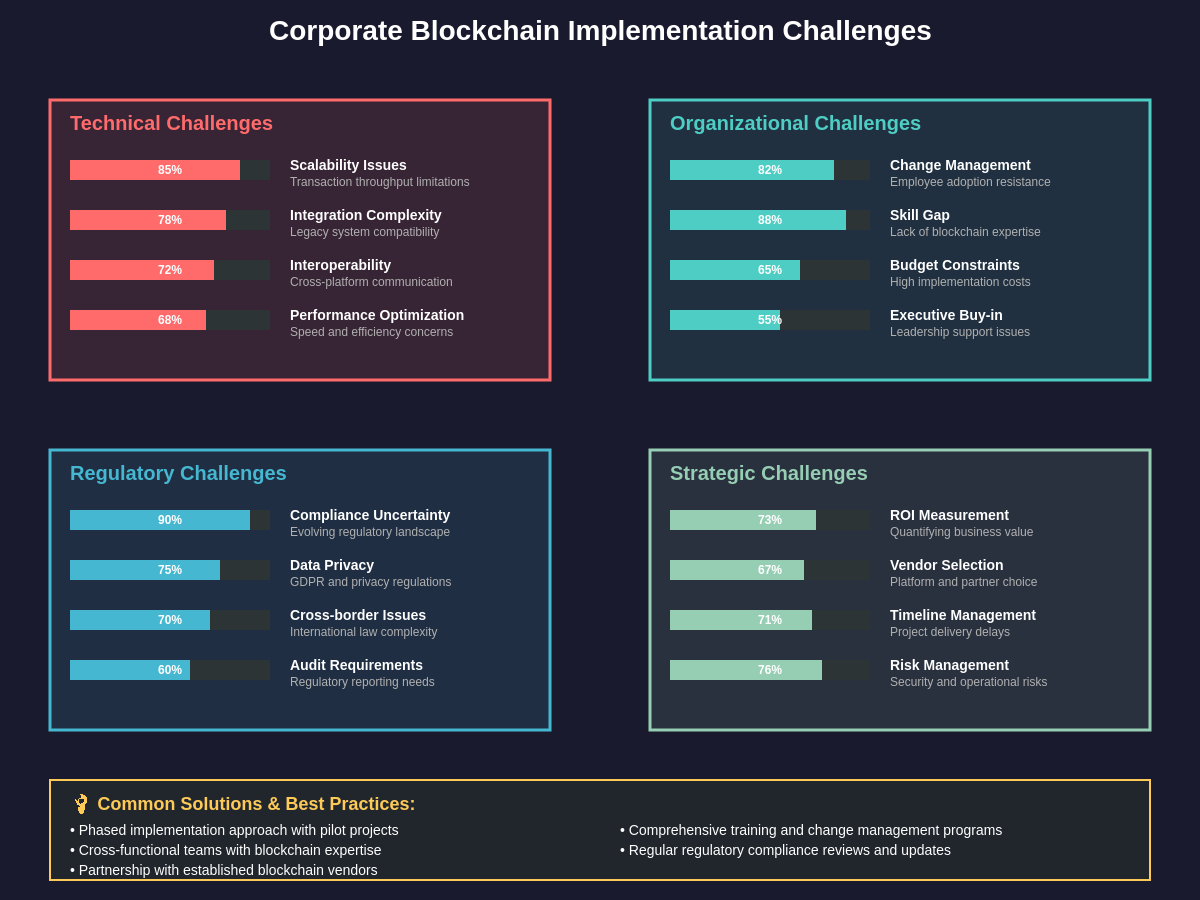The Corporate Blockchain Revolution
The integration of blockchain technology into major corporate operations has accelerated dramatically over the past two years, with Fortune 500 companies increasingly recognizing the transformative potential of distributed ledger systems for enhancing transparency, efficiency, and trust in their business processes. This corporate adoption represents a fundamental shift from blockchain’s early association with cryptocurrency speculation toward practical applications that solve real-world business challenges across industries ranging from supply chain management and financial services to healthcare and entertainment.

Major corporations are discovering that blockchain technology offers unique advantages in creating immutable records, enabling secure peer-to-peer transactions, reducing intermediary costs, and providing unprecedented levels of transparency in complex business relationships. The technology’s ability to create trustless systems where multiple parties can interact without requiring a central authority has proven particularly valuable for large enterprises operating across multiple jurisdictions and dealing with complex networks of suppliers, partners, and customers.
The current wave of corporate blockchain adoption is characterized by a more mature and strategic approach compared to earlier experimental implementations, with companies focusing on specific use cases that deliver measurable business value rather than pursuing blockchain for its novelty. This evolution reflects a deeper understanding of the technology’s capabilities and limitations, leading to more successful deployments that integrate seamlessly with existing enterprise systems and processes.
Supply Chain Transparency and Traceability
Supply chain management has emerged as one of the most compelling use cases for corporate blockchain implementation, with companies leveraging distributed ledger technology to create comprehensive traceability systems that track products from raw materials through manufacturing, distribution, and final sale. Major retailers like Walmart have implemented blockchain-based systems that can trace food products back to their source within seconds rather than days, dramatically improving food safety response times and reducing the scope of potential contamination incidents.

The luxury goods industry has particularly embraced blockchain technology for combating counterfeiting and verifying authenticity, with companies like LVMH implementing comprehensive tracking systems that create digital certificates for high-value items throughout their lifecycle. These systems not only protect brand integrity but also provide consumers with verifiable proof of authenticity and ownership history, adding significant value to luxury purchases while reducing the market for counterfeit goods.
Pharmaceutical companies have found blockchain technology invaluable for ensuring drug authenticity and preventing counterfeit medications from entering the supply chain, with implementations that track pharmaceutical products from manufacturing through distribution to patient delivery. This application has become increasingly critical as regulatory requirements for drug traceability have expanded globally, making blockchain-based systems essential infrastructure for pharmaceutical operations in many jurisdictions.
The automotive industry has leveraged blockchain technology to create comprehensive parts traceability systems that track components throughout the manufacturing process and vehicle lifecycle, enabling more effective recalls, warranty management, and quality control processes. These systems provide unprecedented visibility into complex automotive supply chains while enabling more efficient management of safety-related issues and regulatory compliance requirements.
Financial Services and Payment Systems
The financial services industry has been at the forefront of corporate blockchain adoption, with major banks and financial institutions implementing distributed ledger systems for various applications including cross-border payments, trade finance, and regulatory reporting. JPMorgan Chase’s JPM Coin and the Interbank Information Network demonstrate how traditional financial institutions are leveraging blockchain technology to reduce settlement times, lower transaction costs, and improve transparency in complex financial transactions.
Cross-border payment systems built on blockchain technology have enabled financial institutions to bypass traditional correspondent banking networks, reducing settlement times from days to minutes while significantly lowering transaction costs for international transfers. These systems have proven particularly valuable for facilitating payments to underserved markets where traditional banking infrastructure is limited or expensive to access through conventional channels.
Trade finance has experienced significant transformation through blockchain implementation, with systems that digitize letters of credit, bills of lading, and other trade documents while creating immutable records of trade transactions. Major banks have collaborated on blockchain-based trade finance platforms that reduce processing times, minimize fraud risk, and improve transparency throughout the trade finance process, benefiting importers, exporters, and financial institutions alike.
Central bank digital currencies represent the most significant potential application of blockchain technology in financial services, with numerous central banks around the world conducting pilot programs and research into digital versions of their national currencies. These initiatives could fundamentally reshape monetary systems while providing governments with enhanced tools for monetary policy implementation and financial system oversight.
Healthcare Data Management and Drug Development
Healthcare organizations have increasingly turned to blockchain technology for managing sensitive medical data while ensuring patient privacy and regulatory compliance, with implementations that create secure, interoperable systems for sharing medical records among healthcare providers. These systems enable patients to maintain control over their medical data while facilitating better care coordination and reducing duplicate testing and procedures.
Pharmaceutical research and development has benefited significantly from blockchain-based systems that create immutable records of clinical trial data, ensuring data integrity and regulatory compliance while enabling more efficient collaboration among research institutions. These systems address longstanding concerns about data manipulation in clinical trials while facilitating more transparent and verifiable research processes that can accelerate drug development timelines.
Medical device manufacturers have implemented blockchain systems for tracking device performance and safety data throughout product lifecycles, enabling more effective monitoring of device safety and more efficient management of recalls and safety notifications. These systems provide regulatory authorities with unprecedented visibility into medical device performance while helping manufacturers identify and address safety issues more quickly.
The integration of blockchain technology with artificial intelligence and machine learning systems in healthcare has created new opportunities for medical research and personalized medicine, with secure data sharing platforms that enable researchers to access diverse datasets while maintaining patient privacy. These applications represent the convergence of multiple advanced technologies to address complex healthcare challenges while respecting individual privacy rights.
Enterprise Resource Planning and Business Process Automation
Major corporations are integrating blockchain technology into their enterprise resource planning systems to create more transparent and efficient business processes, with implementations that automate contract execution, supply chain coordination, and financial reconciliation through smart contracts and distributed ledger systems. These integrations reduce manual processing requirements while improving accuracy and reducing the potential for errors or fraud in complex business transactions.
Smart contract implementation in enterprise systems has enabled automated execution of business agreements based on predefined conditions, reducing the need for manual intervention and oversight while ensuring consistent application of contractual terms. Companies have found these systems particularly valuable for managing complex supplier relationships, service level agreements, and performance-based contracts that require ongoing monitoring and automatic adjustments based on measured outcomes.
TradingView’s enterprise blockchain analytics provide corporations with sophisticated tools for monitoring blockchain-based business processes and analyzing the performance of distributed ledger implementations. These analytics platforms have become essential infrastructure for enterprises seeking to optimize their blockchain investments and ensure that distributed ledger systems deliver measurable business value.
Document management and digital identity verification have been transformed through blockchain implementation, with systems that create tamper-proof records of important business documents while enabling secure verification of identity and credentials. These applications have proven particularly valuable for industries with strict regulatory requirements and complex compliance obligations, where document authenticity and identity verification are critical business processes.
Real Estate and Asset Tokenization
The real estate industry has embraced blockchain technology for property transactions, title management, and fractional ownership through tokenization, with systems that reduce transaction costs, improve transparency, and enable new forms of property investment. Major real estate companies have implemented blockchain-based systems that streamline property transfers while creating immutable records of ownership and transaction history that reduce title disputes and fraud risk.
Asset tokenization has emerged as a transformative application of blockchain technology, enabling companies to create digital representations of physical assets that can be traded, subdivided, and managed more efficiently than traditional asset ownership structures. This technology has enabled new forms of investment in real estate, art, commodities, and other traditionally illiquid assets while providing investors with enhanced liquidity and portfolio diversification opportunities.
Property management companies have leveraged blockchain technology to create transparent and automated systems for rent collection, maintenance requests, and lease management, with smart contracts that automatically execute routine property management tasks while creating comprehensive records of all property-related transactions. These systems have improved tenant satisfaction while reducing administrative costs and improving operational efficiency for property managers.
The integration of blockchain technology with Internet of Things devices in smart buildings has created new opportunities for automated building management and energy optimization, with systems that automatically adjust building systems based on occupancy patterns and energy usage while creating immutable records of building performance data that can be used for optimization and regulatory reporting purposes.
Energy and Sustainability Applications
Energy companies have implemented blockchain technology for renewable energy certificate trading, grid management, and peer-to-peer energy trading, with systems that enable more efficient and transparent energy markets while supporting the transition to renewable energy sources. These applications have proven particularly valuable for managing complex renewable energy credit systems and enabling more efficient trading of environmental attributes associated with clean energy generation.
Carbon credit trading has been revolutionized through blockchain implementation, with systems that create transparent and verifiable records of carbon offset projects while enabling more efficient trading of carbon credits among corporations seeking to meet sustainability commitments. Major corporations have used these systems to demonstrate their environmental commitments while supporting the development of verified carbon offset projects around the world.
Supply chain sustainability monitoring has benefited from blockchain technology through systems that track environmental and social impacts throughout complex supply chains, enabling companies to verify sustainability claims and demonstrate progress toward environmental and social responsibility goals. These systems provide stakeholders with unprecedented visibility into corporate sustainability performance while helping companies identify opportunities for improvement.
Energy grid management has been enhanced through blockchain-based systems that enable more efficient coordination of distributed energy resources, demand response programs, and grid stability services, with implementations that support the integration of renewable energy sources while maintaining grid reliability. These systems represent critical infrastructure for the transition to more sustainable and resilient energy systems.
Entertainment and Intellectual Property Protection
The entertainment industry has leveraged blockchain technology for content distribution, royalty management, and intellectual property protection, with systems that create immutable records of content ownership and usage while enabling more efficient and transparent royalty distribution to creators and rights holders. Major record labels and streaming platforms have implemented blockchain-based systems that ensure artists receive fair compensation for their work while reducing administrative costs and disputes.
Non-fungible tokens have enabled new forms of digital content ownership and monetization, with major entertainment companies creating blockchain-based systems that allow fans to own unique digital collectibles and experiences while providing creators with new revenue streams. These applications have demonstrated the potential for blockchain technology to create new economic models for digital content while enhancing fan engagement and loyalty.
Gaming companies have integrated blockchain technology to create player-owned economies where in-game assets can be traded, sold, and transferred between different games and platforms, with systems that give players true ownership of their digital assets while enabling new forms of gameplay and social interaction. These implementations represent a fundamental shift in how digital assets are owned and managed in gaming environments.
Digital rights management has been enhanced through blockchain implementation, with systems that create comprehensive records of intellectual property ownership and usage rights while enabling more efficient licensing and enforcement of digital rights. These systems have proven particularly valuable for protecting high-value intellectual property while enabling more flexible and efficient licensing arrangements.
Banking and Traditional Finance Transformation
Traditional banking institutions have undergone significant transformation through blockchain integration, with implementations that modernize legacy systems while improving security, reducing costs, and enhancing customer experiences. Major banks have developed blockchain-based systems for identity verification, loan processing, and regulatory reporting that significantly reduce processing times while improving accuracy and compliance.
Investment management has been revolutionized through blockchain-based systems that provide transparent and immutable records of investment transactions while enabling more efficient settlement and custody services. These systems have reduced operational risks while improving investor confidence through enhanced transparency and accountability in investment management processes.

Insurance companies have implemented blockchain technology for claims processing, policy management, and fraud detection, with systems that automate routine insurance processes while creating comprehensive records of policy transactions and claims history. These implementations have reduced administrative costs while improving customer satisfaction through faster claims processing and more transparent policy management.
Advanced blockchain market analysis tools enable financial institutions to monitor and analyze blockchain-based financial systems while making informed decisions about technology adoption and investment strategies. These analytical capabilities have become essential for financial institutions seeking to leverage blockchain technology effectively while managing associated risks and regulatory requirements.
Manufacturing and Quality Control
Manufacturing companies have integrated blockchain technology into quality control systems that create comprehensive records of production processes while enabling more effective tracking of product quality and safety throughout manufacturing operations. These systems provide manufacturers with unprecedented visibility into production processes while enabling more efficient identification and resolution of quality issues.
Aerospace and defense contractors have implemented blockchain-based systems for parts authentication and supply chain security, with applications that ensure the authenticity and integrity of critical components while protecting against counterfeit parts that could compromise safety and security. These systems have become essential infrastructure for industries where component authenticity is critical for safety and national security.
Automotive manufacturers have leveraged blockchain technology for warranty management, recall coordination, and parts traceability, with systems that create comprehensive records of vehicle components and service history while enabling more efficient management of safety-related issues and regulatory compliance requirements. These implementations have improved customer satisfaction while reducing costs associated with warranty and recall management.
The integration of blockchain technology with industrial Internet of Things systems has created new opportunities for predictive maintenance and equipment optimization, with systems that create immutable records of equipment performance data while enabling more efficient maintenance scheduling and equipment lifecycle management. These applications represent the convergence of blockchain technology with advanced manufacturing systems to improve operational efficiency and reduce downtime.
Regulatory Compliance and Reporting
Regulatory compliance has been significantly enhanced through blockchain implementation, with systems that create comprehensive and immutable records of business transactions while enabling more efficient regulatory reporting and audit processes. Major corporations have found these systems invaluable for demonstrating compliance with complex regulatory requirements while reducing the costs and administrative burden associated with regulatory reporting.
Anti-money laundering and know-your-customer processes have been streamlined through blockchain-based identity verification systems that create secure and verifiable records of customer identities while enabling more efficient compliance with financial regulations. These systems have reduced compliance costs while improving the effectiveness of anti-money laundering programs through enhanced transparency and traceability.
Tax reporting and audit processes have been simplified through blockchain implementation, with systems that create comprehensive records of business transactions while enabling more efficient tax calculation and reporting. These systems have reduced the administrative burden of tax compliance while improving accuracy and reducing the risk of errors or omissions in tax reporting.
Environmental, social, and governance reporting has benefited from blockchain technology through systems that create verifiable records of corporate sustainability performance while enabling more transparent communication with stakeholders about corporate responsibility initiatives. These systems have become increasingly important as regulatory requirements for ESG reporting have expanded globally.
Integration Challenges and Solutions
The integration of blockchain technology into existing corporate systems presents significant technical and organizational challenges that require careful planning and execution to overcome successfully. Major corporations have learned that successful blockchain implementation requires comprehensive change management, extensive staff training, and careful integration with legacy systems to avoid disruption of critical business processes.

Scalability remains a significant challenge for corporate blockchain implementations, with many distributed ledger systems struggling to handle the transaction volumes required by large enterprises while maintaining acceptable performance levels. Companies have addressed these challenges through hybrid architectures that combine blockchain technology with traditional databases and processing systems to achieve optimal performance and scalability.
Interoperability between different blockchain platforms and existing enterprise systems has required significant investment in integration technologies and standards development, with corporations working together to develop common protocols and interfaces that enable seamless communication between different blockchain implementations. These efforts have been essential for creating blockchain ecosystems that can deliver value across complex corporate environments.
Data privacy and security concerns have required careful attention to encryption, access controls, and regulatory compliance requirements, with corporations implementing sophisticated security measures that protect sensitive business data while enabling the transparency and immutability benefits of blockchain technology. These implementations demonstrate that blockchain systems can meet enterprise security requirements while delivering significant business value.
Future Outlook and Emerging Trends
The future of corporate blockchain adoption appears increasingly promising as technology maturity improves and successful use cases demonstrate clear business value, with analysts predicting continued growth in enterprise blockchain investments and implementations across diverse industries. Companies that have successfully implemented blockchain technology are expanding their use of distributed ledger systems while sharing best practices and lessons learned with industry peers.
Emerging trends in corporate blockchain adoption include increased focus on sustainability applications, integration with artificial intelligence and machine learning systems, and development of industry-specific blockchain platforms that address unique requirements and challenges. These trends suggest that blockchain technology will become increasingly specialized and tailored to specific industry needs rather than remaining a general-purpose technology solution.
The convergence of blockchain technology with other emerging technologies including Internet of Things, artificial intelligence, and quantum computing promises to create new opportunities for corporate innovation and competitive advantage, with early adopters positioned to benefit from first-mover advantages in emerging technology applications. These convergence opportunities represent significant potential for companies willing to invest in advanced technology research and development.
Comprehensive blockchain market research and analysis provide corporate decision-makers with essential insights into blockchain technology trends and investment opportunities, enabling more informed strategic planning and technology adoption decisions. These analytical resources have become critical tools for executives seeking to understand and capitalize on blockchain technology opportunities while managing associated risks and challenges.
Investment and Implementation Strategies
Corporate investment in blockchain technology has evolved from experimental pilot projects to strategic enterprise implementations that deliver measurable business value and competitive advantage, with successful companies developing comprehensive blockchain strategies that align with overall business objectives and technology roadmaps. These strategic approaches have proven essential for maximizing the return on blockchain technology investments while minimizing implementation risks and challenges.
Partnership and collaboration strategies have become increasingly important for successful blockchain implementation, with corporations working together to develop shared infrastructure, common standards, and interoperable systems that benefit entire industries rather than individual companies. These collaborative approaches have accelerated blockchain adoption while reducing implementation costs and technical risks for participating organizations.
Talent acquisition and development have emerged as critical success factors for corporate blockchain initiatives, with companies investing heavily in blockchain expertise and training programs that develop internal capabilities for blockchain system design, implementation, and management. These investments in human capital have proven essential for long-term success in blockchain technology adoption and innovation.
Risk management strategies for blockchain implementation have become increasingly sophisticated as companies gain experience with distributed ledger systems and better understand the potential risks and mitigation strategies associated with blockchain technology. These risk management approaches have enabled more confident investment in blockchain technology while protecting companies from potential security, regulatory, and operational risks.
Disclaimer: This article is for informational purposes only and does not constitute financial, investment, or technology advice. Cryptocurrency and blockchain investments carry significant risks, including the potential for total loss of capital. Past performance does not guarantee future results. Always conduct thorough research and consult with qualified professionals before making investment or technology adoption decisions. The regulatory landscape for blockchain technology continues to evolve, and companies should ensure compliance with applicable laws and regulations in their jurisdictions.